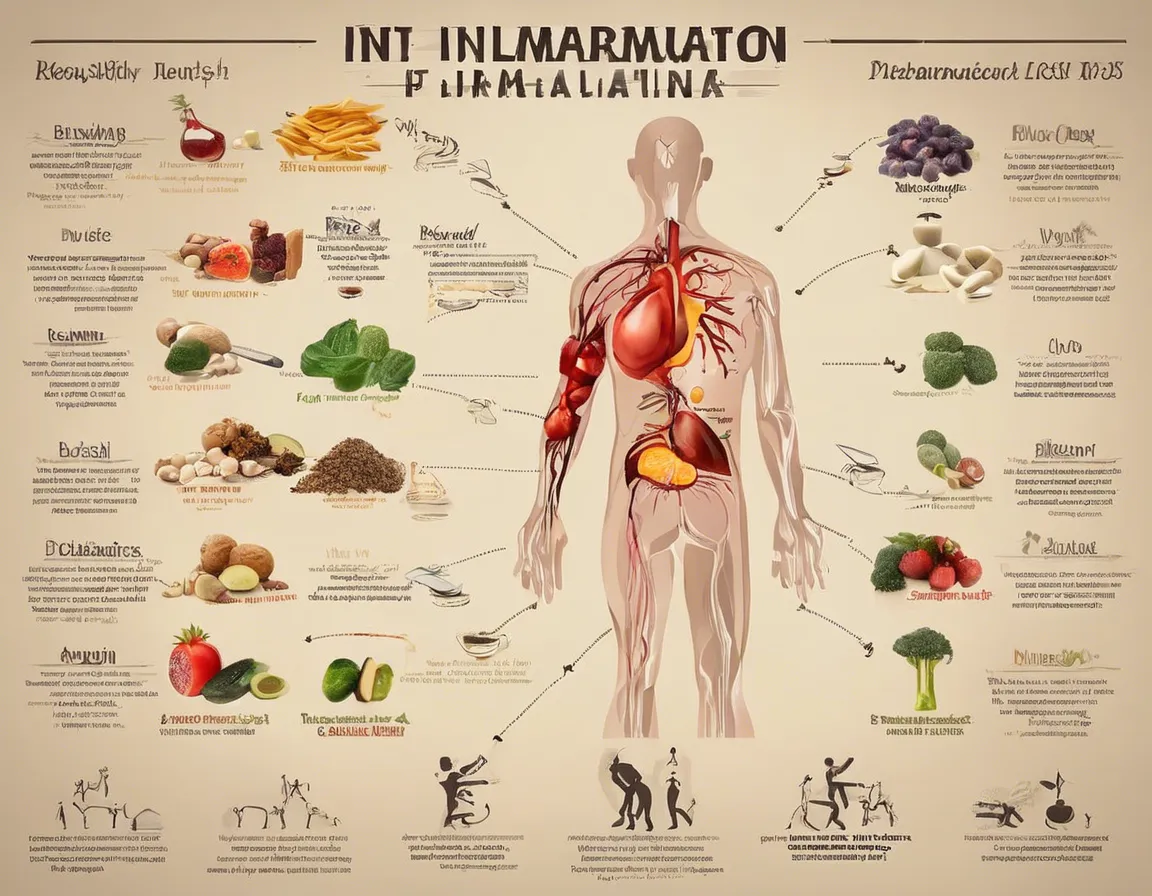
Inflammation can be a real pain, but there are natural ways to help reduce it. Check out these 15 easy and effective methods to feel better naturally.
Eat Anti-Inflammatory Foods

Adding berries like blueberries and strawberries to your diet can help fight inflammation. These fruits are packed with antioxidants, which help your body reduce swelling and promote overall health.
Fatty fish such as salmon and mackerel are excellent sources of omega-3 fatty acids. These healthy fats are known to decrease inflammation and support heart health, making them a great addition to your meals.
Leafy greens like spinach and kale are rich in vitamins and minerals that help lower inflammation. Including these vegetables in your diet can improve your body’s ability to fight off illnesses and maintain a healthy balance.
Stay Hydrated

Drinking enough water helps get rid of toxins and keeps your body running smoothly. Try to drink at least 8 glasses of water every day for better health.
Water can boost your energy levels, improve your mood, and even help with weight management. Staying hydrated is a simple way to support your overall well-being.
Proper hydration also keeps your skin looking fresh and healthy. When you drink enough water, your skin can maintain its natural glow and elasticity.
Exercise Regularly

Regular exercise can help lower inflammation in your body. Try to mix in cardio like running or biking with strength training and stretching exercises. This combination can boost your overall health and keep inflammation at bay.
Adding strength training to your routine can help build muscle and reduce inflammation. Lifting weights or using resistance bands a few times a week can make a big difference in how you feel and support your immune system.
Don’t forget to include flexibility exercises like yoga or stretching. These activities not only help reduce inflammation but also improve your range of motion and decrease the risk of injuries. Aim for a balanced workout plan to get the best results.
Get Enough Sleep

Getting enough sleep helps your body fight inflammation. Aim for 7-9 hours each night so your body can rest and heal. Good sleep will make you feel better and keep inflammation levels low.
A regular sleep schedule can do wonders for your health. Going to bed and waking up at the same time every day helps your body get into a rhythm, making it easier to get the rest you need to reduce inflammation.
Creating a calming bedtime routine can improve your sleep quality. Try activities like reading, gentle stretching, or meditating before bed. These habits can help you fall asleep faster and enjoy a deeper, more restorative sleep each night.
Manage Stress

Stress can make inflammation worse. Try relaxing activities like meditation, deep breathing, or yoga to help keep your stress levels down.
Taking a few minutes each day to focus on your breath can make a big difference in how you handle stress. Simple practices can lead to a calmer mind and reduced inflammation.
Yoga combines physical movement with mental focus, offering a way to manage stress effectively. Regular practice can help you stay relaxed and keep inflammation in check.
Use Turmeric

Turmeric is known for its anti-inflammatory benefits, mainly due to curcumin. Adding turmeric to your diet can help reduce inflammation in your body, potentially improving overall health. Sprinkle it on your meals or mix it into smoothies for a tasty boost.
Curcumin, the key ingredient in turmeric, can help with joint pain and stiffness. Many people find relief by incorporating turmeric into their daily routines. You can take turmeric supplements if you don’t enjoy the taste in food.
Besides its anti-inflammatory effects, turmeric has antioxidant properties that can support a healthy immune system. It’s a simple and natural way to give your body an extra line of defense. Try adding it to teas or soups for an easy addition to your diet.
Include Omega-3s

Omega-3 fatty acids, found in fish oil and flaxseeds, can help reduce inflammation. Include them in your diet through food or supplements.
Omega-3s are essential for brain health and can improve cognitive function. Eating fish like salmon or taking a daily fish oil supplement can provide these benefits.
Adding Omega-3s to your diet can also promote heart health by lowering blood pressure and reducing cholesterol levels. Consider incorporating chia seeds or walnuts to boost your intake naturally.
Avoid Processed Foods

Eating processed foods can lead to inflammation, which can be harmful to your health. Choosing whole, natural foods helps keep your body balanced and supports overall wellness.
Processed foods often contain added sugars, unhealthy fats, and artificial ingredients that can disrupt your body’s natural processes. Opting for fresh, unprocessed foods is a healthier choice.
Sticking to whole foods like fruits, vegetables, nuts, and lean proteins can improve your energy levels and help prevent chronic diseases. Avoiding processed foods is a simple step toward better health.
Try Green Tea

Green tea is loaded with antioxidants that can help reduce inflammation in your body. Drinking a cup or two every day can be a simple way to boost your health.
Aside from its anti-inflammatory properties, green tea can also give you a gentle energy boost thanks to its natural caffeine content. It’s a great alternative to coffee.
Green tea has been linked to improved brain function and fat loss. Including it in your daily routine could provide both mental and physical health benefits.
Use Ginger

Ginger is a natural way to fight inflammation. You can add it to your meals, brew it in a tea, or take it as a supplement. Its anti-inflammatory properties can help ease pain and swelling, making it a great addition to your diet.
Including ginger in your daily routine can be simple and rewarding. Whether you grate it into your stir-fry, sip on ginger tea, or opt for ginger supplements, you’ll be taking a step towards better health by reducing inflammation naturally.
Ginger not only helps with inflammation but also boosts your immune system. By adding ginger to your meals or drinks, you can enjoy its benefits, including improved digestion and increased energy levels. It’s an easy and tasty way to support your overall wellness.
Cut Down on Sugar

Eating too much sugar can cause your body to become inflamed, which can lead to various health problems. By cutting back on sugary snacks and drinks, you can help reduce inflammation and improve your overall well-being.
Many sugary foods and drinks contain empty calories, which means they provide energy but little to no nutritional value. Reducing your sugar intake can help you maintain a healthy weight and avoid the negative effects of consuming empty calories.
Switching to healthier alternatives like fruits, nuts, and water can make a big difference in your diet. These options not only satisfy your sweet tooth but also provide essential nutrients and hydration, supporting better health.
Add More Fiber

Fiber is great for keeping your digestive system on track. Fruits, vegetables, and whole grains are packed with fiber, which can help you stay regular and feel better overall.
Eating more fiber can also help lower inflammation in your body. This means less pain and a reduced chance of chronic diseases. Simple changes like adding more veggies to your meals can make a big difference.
Whole grains are another excellent source of fiber. Foods like brown rice, oats, and whole wheat bread not only fill you up but also support a healthy gut. Try swapping refined grains for whole grains in your diet.
Use Essential Oils

Lavender oil is known for its calming effects, which can help reduce stress and promote better sleep. Simply add a few drops to your pillow or use it in a diffuser to enjoy its relaxing aroma.
Peppermint oil is great for easing headaches and muscle pain. Mix it with a carrier oil like coconut oil and apply to the affected areas for relief. Its fresh scent can also help clear your sinuses.
Tea tree oil has powerful anti-inflammatory and antimicrobial properties, making it useful for treating minor cuts and skin irritations. Always dilute it with a carrier oil before applying to the skin to avoid irritation.
Limit Alcohol

Drinking too much alcohol can make your body more inflamed. Try to drink less or stop altogether. This can help lower the inflammation and improve your overall health.
Alcohol is not just bad for your liver. It can also cause more inflammation in your body, making you feel worse. Cutting back on alcohol can make a big difference in how you feel.
If you want to keep inflammation down, think about drinking less alcohol. Even small changes, like having fewer drinks each week, can help you feel healthier and reduce inflammation.
Stay Active

Regular movement, like walking or stretching, can help lower inflammation. Try to keep moving throughout the day to feel better and stay healthy. Even short breaks to stand up or walk around can make a big difference.
Physical activity doesn’t have to be intense to be effective. Simple actions like taking the stairs, doing light exercises, or even gardening can keep you active. Find what you enjoy and make it a part of your daily routine.
Staying active not only helps with inflammation but also boosts your mood and energy levels. Activities like yoga or a quick walk outdoors can refresh your mind and body, making it easier to handle everyday stress.
Conclusion
Incorporating these natural methods into your daily routine can make a big difference in reducing inflammation. From eating the right foods to staying active, these tips are simple yet effective. Give them a try and see how they work for you. Remember, small changes can lead to big improvements in your overall health and well-being.




